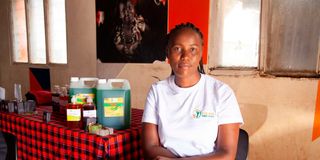Painful childhood experience prompted me to support women from slums areas

What you need to know:
- “This is a trauma I have grown up with and I believe that if my mother was economically empowered, she would have fought for justice on my behalf.
- "This is what inspired me to start empowering women economically, especially those residing in the slums.
- “I started a women’s empowerment project in Kasarani where I trained 15 women on how to make detergents and bathing soaps,” she says.
Dorcas Nyamanya was born and brought up in an informal settlement in Kisii County where she lived with her parents. At the age of seven, she went through a painful ordeal of defilement, but her mother was unable to get justice for her due to lack of money.
Sexual abuse cases are quite common in slums and rural areas, and what made it more painful for Dorcas is that the act was perpetrated by a close family member.
“My mother had no source of income and our culture discouraged us from exposing him. Mum kept quiet about it to save her marriage.
“This is a trauma I have grown up with and I believe that if my mother was economically empowered, she would have fought for justice on my behalf. This is what inspired me to start empowering women economically, especially those residing in the slums.
“In 2020, when Covid-19 broke out, I felt it was the right time to begin my mission since many women had lost their sources of income, especially those who were casual laborers.
“I started a women’s empowerment project in Kasarani where I trained 15 women on how to make detergents and bathing soaps,” she says.
Dorcas later moved to Korogocho slums where she formed Xolani Women of Hope, a social enterprise that aims to empower disadvantaged girls and young women so that they can afford a decent life.
“Women living in slums face numerous challenges, and giving them a means to make a living really gives them hope,” she says.
Through the group, the women are equipped with technical skills like soap making, beadwork, machine knitting and computer skills.
“We also train them on how to manage small businesses. Successful trainees receive capital and continuous mentorship to help them navigate the business environment.
“I have adapted a model that I refer to as a Flexi model to remove the obstacles that may block women from living their best lives. The key features of this model are provision of daycare services, and flexible training schedules to ensure the women don’t miss out on training.
“I train the women for free, but we also rely on support from well-wishers. I work with the area chief and elders to identify needy cases, then we interview them and those who qualify are taken in for the training.
“I chose Korogocho because I realised there was already too much focus on Kibera and Mathare slums. It is also closer to where I live, and I had to start at home.
“I am currently working on a research plan on gender, capacity building and women empowerment in rural Kenya.
“Since women in rural areas face different challenges, I first need to understand what will work for them.
“I chose to empower women living in the slums mainly because in May 2022, I was privileged to get the Ban Ki Moon GC Scholarship to attend Bordeaux University summer school.
There, I learnt how small initiatives can make our cities sustainable, bearing in mind the challenges brought about by rural-urban migration.
“I got to know about the scholarship from a Facebook page titled Opportunities for Africa that highlights opportunities available for Africans, and I went on to apply.
I did a write up on what I have been doing to empower women, and shortly afterwards I got communication from them that I had been selected as one of the 17 scholars from the five countries.
This came as a surprise since what I was doing seemed small in my eyes. I am glad the programme has been so insightful. Through the summer school, I’ve been able to conduct workshops, as well as receive mentorship and funding.
As part of the programme, participants were asked to propose a project they would like to do, and create a budget for it. Once the proposal is approved, you get funding for your project.
In future, I plan to incorporate more technical training and set up a new training centre within Korogocho slum.”





